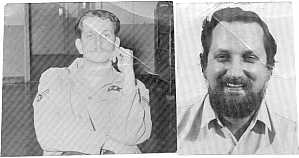
Paul A. Marsh
It was during the Korean War, the early 1950's, and I was in basic training in upstate New York. Several Yale professors and Air Force officers came to Sampson AFB for the purpose of screening some 5,000 basic trainees on their foreign language aptitude. The Air Force had a Chinese language program going at Yale and most of the students entering it were young recruits. We studied, listened, and tested for four days. After all but the final screening, I ended up in a group of thirty. Twenty-five were destined for New Haven. But itcwas not-in the cards for me to study Chinese at that time. To say that I was disappointed would be an understatement.
Following four years of service and a bit of working I entered Pierce College in Southern California as a forestry student. After two and a half years and much trouble with math, I ventured north to Humboldt State--again, as a forestry major. Forestry was a dream for me and that dream of philosopher foresters charged with stewardship of the public domain came into conflict with what I soon discovered to be a group of professionals seemingly uninterested in any philosophy of a public charge. A year later, after a summer with the Forest Service, some more trouble with math, and much soul searching, I "came out of the woods."
Political science had interested me for a long time and that seemed the natural choice. After two more years I had a B. A. in hand and was off to graduate school. After three years at USC, which included the same period of Chinage language, I was on my way with an M. A. in Asian Studies.
Claremont Graduate School, 35 miles east of Los Angeles, attracted me. I began work on a Ph.D. in International Relations. Upon arrival in Claremeont I started to substitute teach at several local high schools. I needed the money and wanted to see just what was going on in these schools. Much to my dismay I soon discovered that classroom control was what each principal wanted of me. A couple of years later I was able to break into college teaching on a part-time basis. I was quite hungry for contact with under- graduates and attempted to grab whatever crumbs of teaching came my way. I was pretty good at this too.
Then I received a Ford Teaching Fellowship and spent the next two years on a part-time basis at Pitzer College in Claremont. I also did some administration work at Pitzer. That school was good to me. I designed my own courses and was treated as a full faculty member. At the same time I was teaching part-time at Cal State, Los Angeles. What a contrast! Pitzer had 675 students and Cal State 21,000. My Pitzies were for the most part from affluent, if not rich, homes and had seen little of the world. On the other hand, my Cal State classes were heavily sprinkled with Vietnam veterans, minorities, and people who had plugged away at a degree for twelve years. They were quite stimulating. However, the impersonalness and bureaucracy of such a large institution bothered me. I wished that I could have com bined the best of both schools.
My professional interests are in the fields of International Relations, American Foreign Policy, and the behavior of man on the international scene generally. I am also heavily involved with the history, politics, and culture of China, Japan, and Korea. And, last but not least, I want to study the effects of the increasing amount of leisure time that all of us have on our recreational resources. I'm here at Evergreen to do those things which I know best; to participate in teaching people about the foreign cultures I know something about; and to venture forth into some areas about which I know little but could and would be willing to learn.